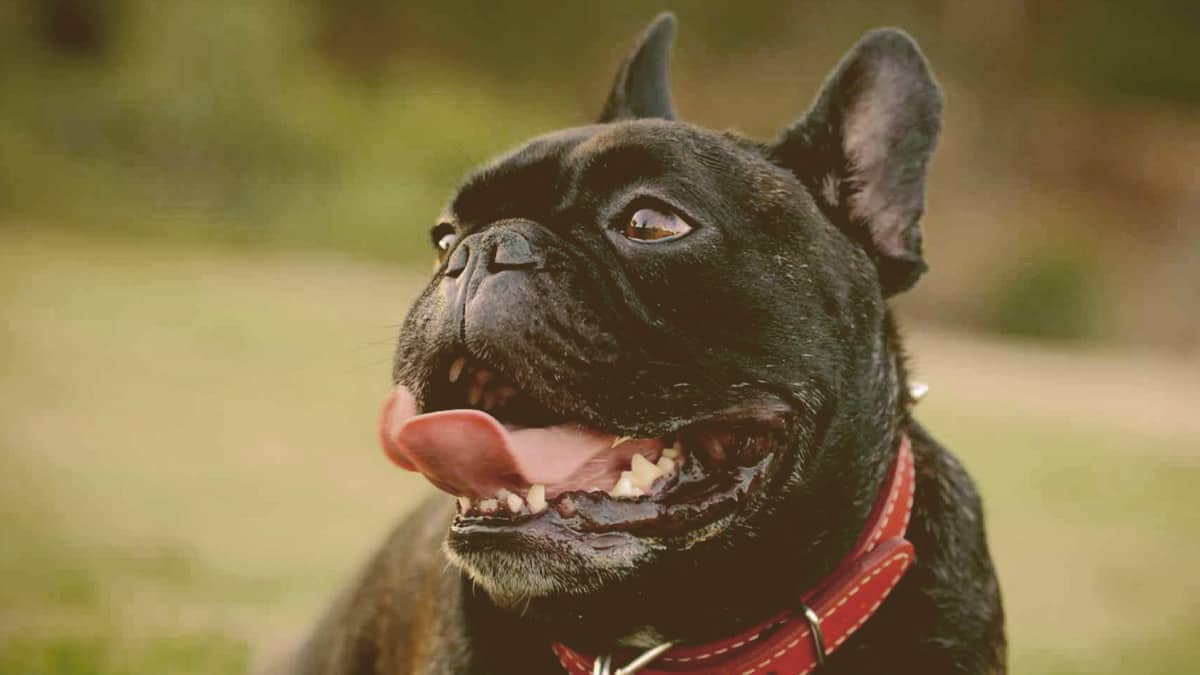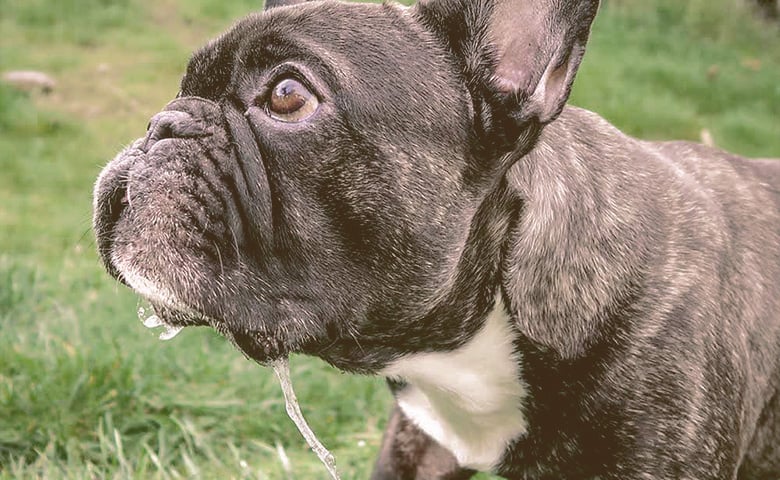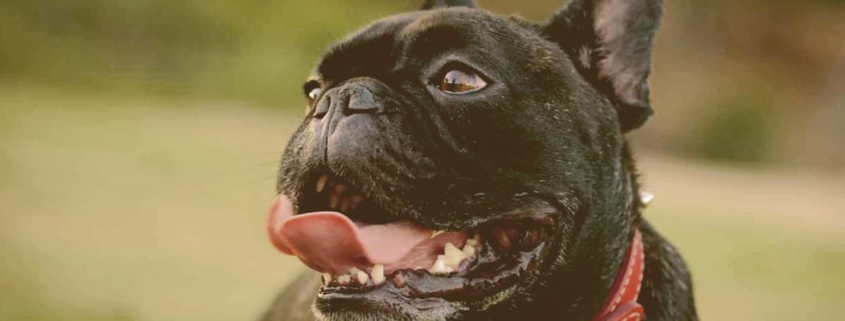
French Bulldog Shaking: 10 Reasons + Prevention
Alex Vicente • Updated on August 1, 2023
- This review contains affiliate links. Read more here.
- Not a substitute for professional veterinary help.
French bulldogs are sensitive, loving animals.
You’ll be catching them shivering every once in a while.
If you’re wondering, “why is my French Bulldog shaking?”
The answer to your question is that various factors might cause a dog’s shiver or tremble.
It may be because they’re happy you came home or because they ate harmful things.
This article helps you answer questions that pop to your mind:
What are the most prevalent causes of a dog shivering or shaking?
Is treatment required?
And when should you consult your veterinarian?
Table of Contents
Help! My Frenchie Is shaking

Dogs shiver for a range of reasons.
The problem is knowing what’s causing the quakes and whether they’re serious.
Here’s a list of the most prevalent reasons for your Frenchie’s shaking:
Generalized Tremor Syndrome (GTS)
According to studies, GTS is a condition characterized by moderate inflammation of the brain and spinal cord covering, resulting in tiny tremors of the head and entire body.
No study has revealed the causes of GTS in dogs.
Symptoms start showing at a young age. Probably between nine months to two years. Corticosteroids are commonly used in treatment. Results are frequently visible within a week after beginning therapy.
You may also want to read:
At What Age Should You Spay a French Bulldog? Plus Pros & Cons
Excitement
Dogs are family.
They’ll get more excited than they should when you’re home.
They’ll bark, shiver or even urinate.
While some of these characteristics are common in dogs, you may assist your canine partner in relaxing by keeping your welcome brief and gentle.
You could try to teach them to sit before responding with a welcome.
Poisoning
A variety of toxins or poisons can cause tremors, or shaking, in dogs.
Some of these are safe for humans but hazardous to pets.
Chocolate, cigarettes, and the sugar replacement found in many chewing gums are examples of products that can be harmful to dogs.
Poisoning symptoms might vary.
They’re as follows:
- Tremors
- Weakness
- Disorientation
- Sadness
- Drooling
- Vomiting
- Diarrhea
- Seizures
If you suspect your dog has consumed something possibly hazardous, contact your veterinarian immediately.

Old age
Some dogs acquire tremors in their rear legs as they age.
Tremors can sometimes be felt in the front legs as well.
These tremors often have little effect on how your dog moves or walks.
It’s tempting to dismiss signs like shaky legs due to your Frenchie “simply getting older.”
However, trembling can also indicate other problems, such as discomfort.
So, if your older pet has tremors, always consult your veterinarian.
Nausea
Dogs, like humans, can become queasy as a result of motion sickness, medicine, overeating, or eating the incorrect item, such as a poisonous plant.
They may also experience nausea as a result of renal or liver disease and other illnesses.
Shaking might indicate that your Frenchie feels sick.
Other symptoms include listlessness, excessive lip-smacking, swallowing or drooling, hiding, yawning, and vomiting.
The source of the sickness determines the treatment for nausea. One reason for nausea is poisoning.
So, if your little one starts vomiting or seems nauseous, and you know what they may have eaten, contact your veterinarian right away.
Distemper
Canine distemper, caused by a virus, is most common among pups and adolescent dogs that have not been adequately vaccinated.
It’s a common cause of Frenchie’s tremors.
Distemper symptoms include eye and nasal discharge, fever, coughing, and other symptoms.
Distemper is often treated with supportive care while your Frenchie’s immune system battles the infection.
Antibiotics, airway dilators, physical therapy, and fluids may all treat dehydration.
Addison’s Disease
Shivering or shaking might be caused by pain, which is a fairly common cause of Addison’s disease.
Detecting your Frenchie’s degree of pain or cause of discomfort is challenging.
You won’t know when to worry or if your little one needs to be rushed to the vet.
This is frequently a matter of judgment, but here are some principles.
If the shivering and shaking are accompanied by heavy panting, it’s frequently an indication of stress and more extreme pain or discomfort.
10 Signs That Your French Is Feeling Stressed

There are a few indicators that make it easy to tell if your Frenchies whether your Frenchie is stressed or not:
1. Shaking or Pacing
You’ve probably seen your dog shaking after a bath or a tumble on the grass.
That whole-body shaking can be funny and is perfectly normal unless it is the consequence of a stressful circumstance.
Dogs, for example, are frequently anxious when they see a veterinarian.
If you pay attention, you’ll notice that they shake their bodies off once they get off the examination table.
Dogs, like humans, pace when they are upset.
While waiting for the veterinarian, some dogs wander around the exam room several times.
2. Whining or Barking
A vocalization is a typical form of self-expression in dogs, although it can become more intense when stressed.
Fearful or anxious dogs may whine or bark to gain your attention or self-soothe.

3. Yawning, Drooling, Licking
Dogs yawn when they are sleepy or bored, and they yawn when they are anxious.
An anxious yawn is longer and more potent than a tired yawn.
When dogs are frightened, they may drool and lick excessively.
4. Observed Changes in the Eyes and Ears
Stressed-out dogs, like stressed-out humans, may have dilated pupils and blink fast.
They may look shocked if they open their eyes wide and reveal more white than usual.
Usually, relaxed or alert ears are pressed back against the head.
5. Alterations in body position
Dogs typically carry equal weight on all four legs.
If a healthy dog with no orthopedic issues transfers weight to his back legs or cowers, he might be stressed.
When dogs are terrified, they may tuck their tails or become somewhat stiff.
6. Shedding
Show dogs who grow agitated in the arena frequently “blow their coat.”
When dogs are at the veterinarian clinic, they also shed a lot.
Although shedding is less evident in outside situations, such as when visiting a new dog park, it rises when a dog is frightened.

7. Panting
Dogs pants when they’re overheated or enthusiastic. Frenchies may also pant out of anxiety.
If your dog is panting despite not exercising, he may be stressed.
8. Alterations in Body Position
Nervous dogs, like humans, may have an unexpected impulse to relieve themselves.
When your dog urinates soon after meeting a new canine companion, he may be marking territory and reacting to the stress simultaneously.
Stress can sometimes manifest as a refusal to eat or a lack of bowel function.
9. Behaviors of Avoidance or Displacement
When confronted with an unpleasant environment, dogs may “leave” by concentrating on something else.
They may lick their genitals, sniff the ground, or look away.
Ignoring someone may not be polite, but it is preferable to being confrontational.
10. Hide or Flee Conduct
Some stressed dogs physically move behind their owners to hide as an extension of avoidance.
They may even push their owners to get them to move.
They may engage in distraction behaviors like digging or circling as a route of escape or slinking behind a tree or parked car.
Tricks to Relieve Your Frenchie’s Stress

There’s only so much that you could do to relieve your Frenchie’s anxiety as it’s a problem that can be accompanied by shaking and trembling.
If you feel that your dog is suffering from anxiety or separation anxiety, you must consult with a dog behavior specialist.
Additionally, you could work with your Frenchie to modify a few behaviors to alleviate their stress levels.
- Buy enrichment games to stimulate their minds.
- Schedule daily long walks to get out their energy and bond.
- Don’t show affection for wrong behaviors.
- Try aromatherapy to help them relax.
Conclusion

If you’ve identified the primary cause of your dog’s shaking behavior, you’ll be halfway to resolving the issue.
All you’ve to do now is decide whether the reason behind your Frenchie’s shaking dictates an urgent trip to the vet.
Your Frenchie could be shaking because they feel excited, stressed, or cold.
It may not be a medical condition, but they’re still issues that need to be handled promptly.








